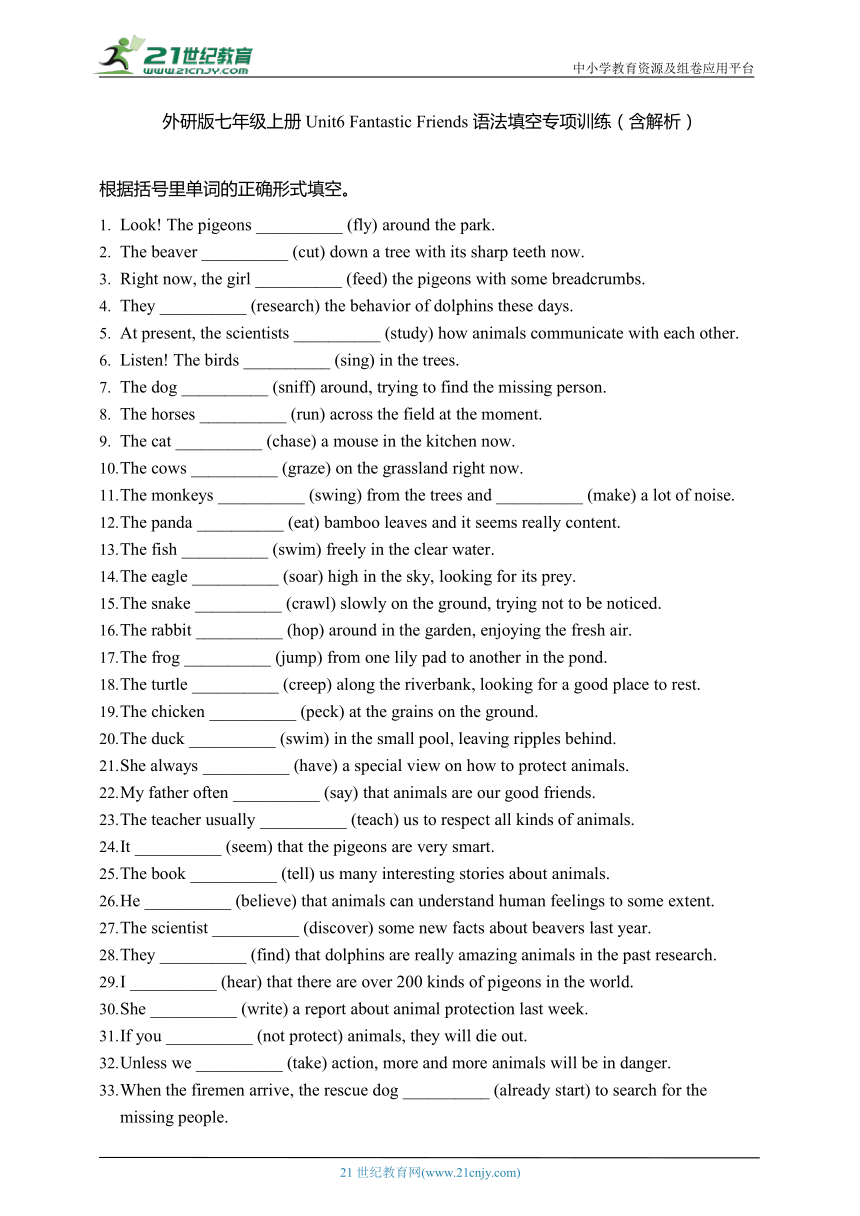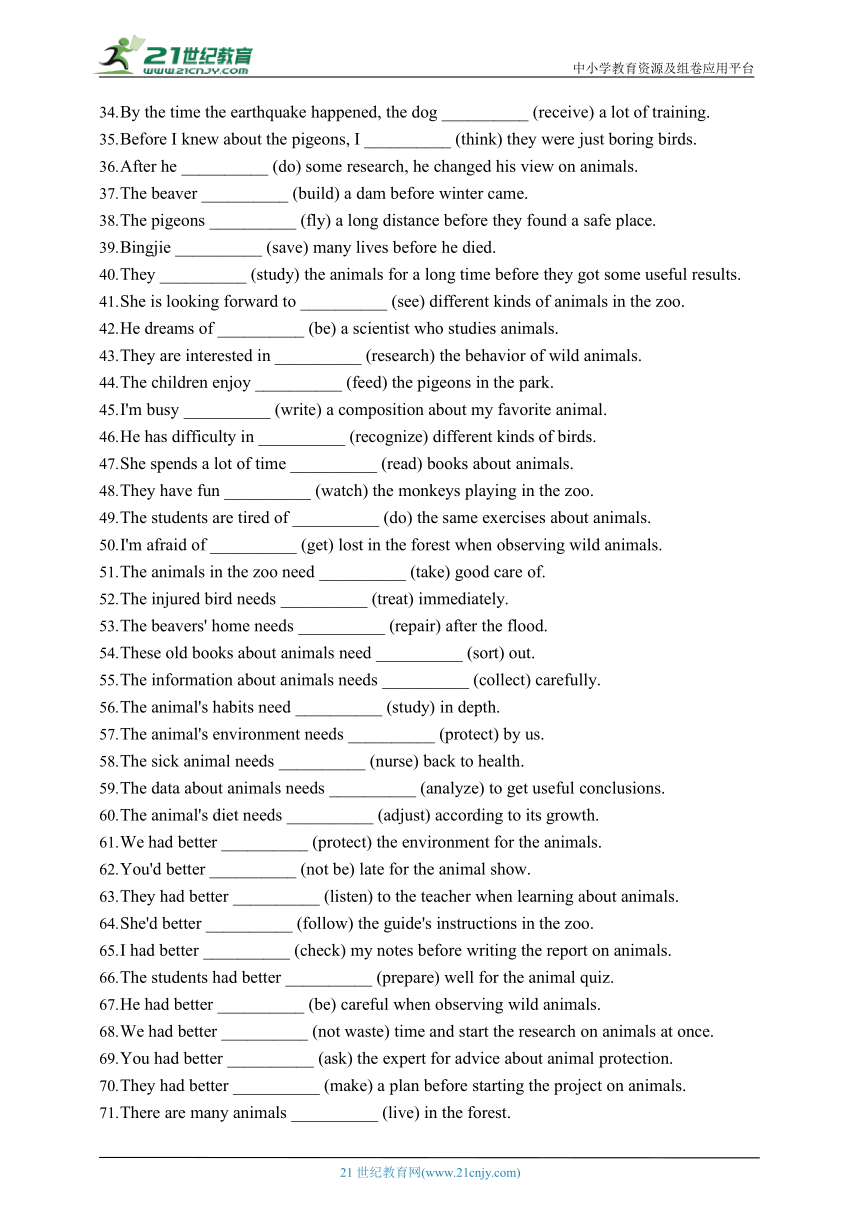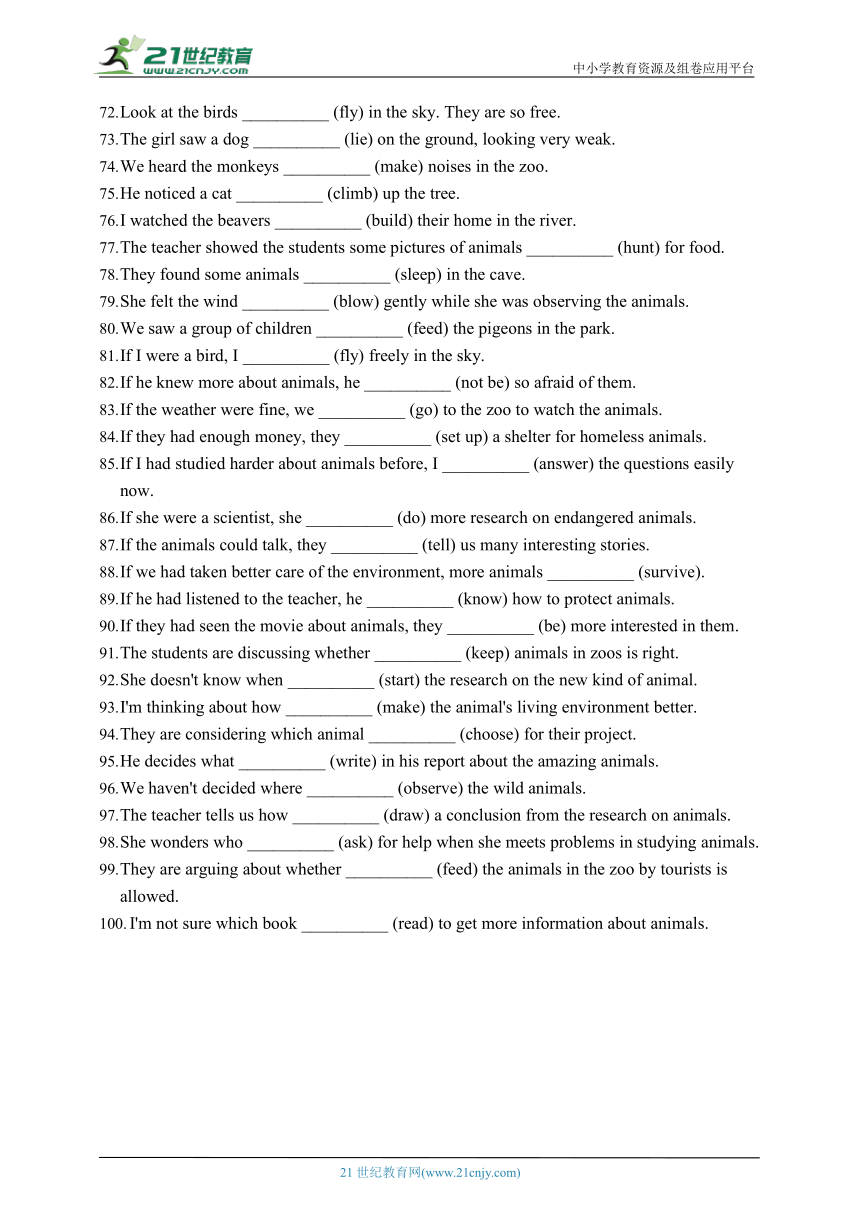 資源簡介
資源簡介
中小學教育資源及組卷應用平臺
外研版七年級上冊Unit6 Fantastic Friends語法填空專項訓練(含解析)
根據括號里單詞的正確形式填空。
Look! The pigeons __________ (fly) around the park.
The beaver __________ (cut) down a tree with its sharp teeth now.
Right now, the girl __________ (feed) the pigeons with some breadcrumbs.
They __________ (research) the behavior of dolphins these days.
At present, the scientists __________ (study) how animals communicate with each other.
Listen! The birds __________ (sing) in the trees.
The dog __________ (sniff) around, trying to find the missing person.
The horses __________ (run) across the field at the moment.
The cat __________ (chase) a mouse in the kitchen now.
The cows __________ (graze) on the grassland right now.
The monkeys __________ (swing) from the trees and __________ (make) a lot of noise.
The panda __________ (eat) bamboo leaves and it seems really content.
The fish __________ (swim) freely in the clear water.
The eagle __________ (soar) high in the sky, looking for its prey.
The snake __________ (crawl) slowly on the ground, trying not to be noticed.
The rabbit __________ (hop) around in the garden, enjoying the fresh air.
The frog __________ (jump) from one lily pad to another in the pond.
The turtle __________ (creep) along the riverbank, looking for a good place to rest.
The chicken __________ (peck) at the grains on the ground.
The duck __________ (swim) in the small pool, leaving ripples behind.
She always __________ (have) a special view on how to protect animals.
My father often __________ (say) that animals are our good friends.
The teacher usually __________ (teach) us to respect all kinds of animals.
It __________ (seem) that the pigeons are very smart.
The book __________ (tell) us many interesting stories about animals.
He __________ (believe) that animals can understand human feelings to some extent.
The scientist __________ (discover) some new facts about beavers last year.
They __________ (find) that dolphins are really amazing animals in the past research.
I __________ (hear) that there are over 200 kinds of pigeons in the world.
She __________ (write) a report about animal protection last week.
If you __________ (not protect) animals, they will die out.
Unless we __________ (take) action, more and more animals will be in danger.
When the firemen arrive, the rescue dog __________ (already start) to search for the missing people.
By the time the earthquake happened, the dog __________ (receive) a lot of training.
Before I knew about the pigeons, I __________ (think) they were just boring birds.
After he __________ (do) some research, he changed his view on animals.
The beaver __________ (build) a dam before winter came.
The pigeons __________ (fly) a long distance before they found a safe place.
Bingjie __________ (save) many lives before he died.
They __________ (study) the animals for a long time before they got some useful results.
She is looking forward to __________ (see) different kinds of animals in the zoo.
He dreams of __________ (be) a scientist who studies animals.
They are interested in __________ (research) the behavior of wild animals.
The children enjoy __________ (feed) the pigeons in the park.
I'm busy __________ (write) a composition about my favorite animal.
He has difficulty in __________ (recognize) different kinds of birds.
She spends a lot of time __________ (read) books about animals.
They have fun __________ (watch) the monkeys playing in the zoo.
The students are tired of __________ (do) the same exercises about animals.
I'm afraid of __________ (get) lost in the forest when observing wild animals.
The animals in the zoo need __________ (take) good care of.
The injured bird needs __________ (treat) immediately.
The beavers' home needs __________ (repair) after the flood.
These old books about animals need __________ (sort) out.
The information about animals needs __________ (collect) carefully.
The animal's habits need __________ (study) in depth.
The animal's environment needs __________ (protect) by us.
The sick animal needs __________ (nurse) back to health.
The data about animals needs __________ (analyze) to get useful conclusions.
The animal's diet needs __________ (adjust) according to its growth.
We had better __________ (protect) the environment for the animals.
You'd better __________ (not be) late for the animal show.
They had better __________ (listen) to the teacher when learning about animals.
She'd better __________ (follow) the guide's instructions in the zoo.
I had better __________ (check) my notes before writing the report on animals.
The students had better __________ (prepare) well for the animal quiz.
He had better __________ (be) careful when observing wild animals.
We had better __________ (not waste) time and start the research on animals at once.
You had better __________ (ask) the expert for advice about animal protection.
They had better __________ (make) a plan before starting the project on animals.
There are many animals __________ (live) in the forest.
Look at the birds __________ (fly) in the sky. They are so free.
The girl saw a dog __________ (lie) on the ground, looking very weak.
We heard the monkeys __________ (make) noises in the zoo.
He noticed a cat __________ (climb) up the tree.
I watched the beavers __________ (build) their home in the river.
The teacher showed the students some pictures of animals __________ (hunt) for food.
They found some animals __________ (sleep) in the cave.
She felt the wind __________ (blow) gently while she was observing the animals.
We saw a group of children __________ (feed) the pigeons in the park.
If I were a bird, I __________ (fly) freely in the sky.
If he knew more about animals, he __________ (not be) so afraid of them.
If the weather were fine, we __________ (go) to the zoo to watch the animals.
If they had enough money, they __________ (set up) a shelter for homeless animals.
If I had studied harder about animals before, I __________ (answer) the questions easily now.
If she were a scientist, she __________ (do) more research on endangered animals.
If the animals could talk, they __________ (tell) us many interesting stories.
If we had taken better care of the environment, more animals __________ (survive).
If he had listened to the teacher, he __________ (know) how to protect animals.
If they had seen the movie about animals, they __________ (be) more interested in them.
The students are discussing whether __________ (keep) animals in zoos is right.
She doesn't know when __________ (start) the research on the new kind of animal.
I'm thinking about how __________ (make) the animal's living environment better.
They are considering which animal __________ (choose) for their project.
He decides what __________ (write) in his report about the amazing animals.
We haven't decided where __________ (observe) the wild animals.
The teacher tells us how __________ (draw) a conclusion from the research on animals.
She wonders who __________ (ask) for help when she meets problems in studying animals.
They are arguing about whether __________ (feed) the animals in the zoo by tourists is allowed.
I'm not sure which book __________ (read) to get more information about animals.
答案解析
根據括號里單詞的正確形式填空。
are flying解析:句中“Look!”是現在進行時的標志詞,主語“the pigeons”是復數,因此用“are flying”。
is cutting解析:“now”提示動作正在進行,主語“the beaver”是單數,因此用“is cutting”。
is feeding解析:“Right now”表示此刻,用現在進行時,主語“the girl”是單數,故為“is feeding”。
are researching解析:“these days”暗示現階段正在進行的動作,主語“they”是復數,用“are researching”。
are studying解析:“At present”意為“目前”,用現在進行時,主語“the scientists”是復數,因此用“are studying”。
are singing解析:“Listen!”是現在進行時的標志,主語“the birds”是復數,故為“are singing”。
is sniffing解析:語境暗示動作正在進行,主語“the dog”是單數,用“is sniffing”。
are running解析:“at the moment”表示“此刻”,用現在進行時,主語“the horses”是復數,因此用“are running”。
is chasing解析:“now”提示現在進行時,主語“the cat”是單數,故為“is chasing”。
are grazing解析:“right now”表示“此刻”,用現在進行時,主語“the cows”是復數,用“are grazing”。
are swinging; making解析:句中兩個動作同時進行,用現在進行時,主語“the monkeys”是復數,因此分別為“are swinging”和“making”(并列動作共用be動詞)。
is eating解析:語境暗示動作正在進行,主語“the panda”是單數,用“is eating”。
are swimming解析:描述當前狀態下正在進行的動作,主語“the fish”此處指多條魚(復數),用“are swimming”。
is soaring解析:動作正在進行,主語“the eagle”是單數,用“is soaring”。
is crawling解析:“trying not to be noticed”暗示動作正在進行,主語“the snake”是單數,故為“is crawling”。
is hopping解析:描述正在進行的動作,主語“the rabbit”是單數,用“is hopping”。
is jumping解析:動作正在進行,主語“the frog”是單數,用“is jumping”。
is creeping解析:“looking for a good place”暗示動作正在進行,主語“the turtle”是單數,故為“is creeping”。
is pecking解析:描述當前動作,主語“the chicken”是單數,用“is pecking”。
is swimming解析:動作正在進行,主語“the duck”是單數,用“is swimming”。
has解析:“always”表示習慣性動作,用一般現在時,主語“she”是第三人稱單數,故為“has”。
says解析:“often”提示一般現在時,主語“my father”是第三人稱單數,用“says”。
teaches解析:“usually”表示通常情況,用一般現在時,主語“the teacher”是第三人稱單數,故為“teaches”。
seems解析:描述客觀事實,用一般現在時,主語“it”是第三人稱單數,用“seems”。
tells解析:陳述書的內容(客觀事實),用一般現在時,主語“the book”是第三人稱單數,故為“tells”。
believes解析:描述個人觀點,用一般現在時,主語“he”是第三人稱單數,用“believes”。
discovered解析:“last year”是一般過去時的標志,故用“discovered”。
found解析:“in the past research”提示過去的動作,用一般過去時,故為“found”。
heard解析:“hear”的動作發生在過去,用一般過去時,故為“heard”。
wrote解析:“last week”提示一般過去時,故為“wrote”。
don't protect解析:if引導的條件狀語從句中,用一般現在時表將來,主語“you”是第二人稱,否定形式為“don't protect”。
take解析:“unless”引導的條件狀語從句,用一般現在時表將來,主語“we”是復數,故為“take”。
will have already started解析:“When the firemen arrive”(一般現在時)表將來,主句動作發生在將來某個時間之前,用將來完成時,故為“will have already started”。
had received解析:“By the time the earthquake happened”(過去時間)提示主句動作發生在過去的過去,用過去完成時,故為“had received”。
had thought解析:“Before I knew”(過去時間)提示主句動作發生在過去的過去,用過去完成時,故為“had thought”。
had done解析:“after”引導的從句動作發生在“changed”(過去)之前,用過去完成時,故為“had done”。
had built解析:“before winter came”(過去時間)提示主句動作發生在過去的過去,用過去完成時,故為“had built”。
had flown解析:“before they found”(過去)提示主句動作發生在過去的過去,用過去完成時,“fly”的過去分詞為“flown”,故為“had flown”。
had saved解析:“before he died”(過去)提示主句動作發生在過去的過去,用過去完成時,故為“had saved”。
had studied解析:“before they got”(過去)提示主句動作發生在過去的過去,用過去完成時,故為“had studied”。
seeing解析:“look forward to”中“to”是介詞,后接動名詞,故為“seeing”。
being解析:“dream of”中“of”是介詞,后接動名詞,故為“being”。
researching解析:“be interested in”中“in”是介詞,后接動名詞,故為“researching”。
feeding解析:“enjoy doing sth”是固定搭配,故為“feeding”。
writing解析:“be busy doing sth”是固定搭配,故為“writing”。
recognizing解析:“have difficulty in doing sth”中“in”是介詞,后接動名詞,故為“recognizing”。
reading解析:“spend time doing sth”是固定搭配,故為“reading”。
watching解析:“have fun doing sth”是固定搭配,故為“watching”。
doing解析:“be tired of doing sth”中“of”是介詞,后接動名詞,故為“doing”。
getting解析:“be afraid of doing sth”中“of”是介詞,后接動名詞,故為“getting”。
taking/to be taken解析:“need doing”=“need to be done”(需要被……),此處“animals”與“take care of”是被動關系,故為“taking”或“to be taken”。
treating/to be treated解析:“need doing”=“need to be done”,“bird”與“treat”是被動關系,故為“treating”或“to be treated”。
repairing/to be repaired解析:“need doing”=“need to be done”,“home”與“repair”是被動關系,故為“repairing”或“to be repaired”。
sorting/to be sorted解析:“need doing”=“need to be done”,“books”與“sort”是被動關系,故為“sorting”或“to be sorted”。
collecting/to be collected解析:“need doing”=“need to be done”,“information”與“collect”是被動關系,故為“collecting”或“to be collected”。
studying/to be studied解析:“need doing”=“need to be done”,“habits”與“study”是被動關系,故為“studying”或“to be studied”。
protecting/to be protected解析:“need doing”=“need to be done”,“environment”與“protect”是被動關系,故為“protecting”或“to be protected”。
nursing/to be nursed解析:“need doing”=“need to be done”,“animal”與“nurse”是被動關系,故為“nursing”或“to be nursed”。
analyzing/to be analyzed解析:“need doing”=“need to be done”,“data”與“analyze”是被動關系,故為“analyzing”或“to be analyzed”。
adjusting/to be adjusted解析:“need doing”=“need to be done”,“diet”與“adjust”是被動關系,故為“adjusting”或“to be adjusted”。
protect解析:“had better do sth”是固定搭配,后接動詞原形,故為“protect”。
not be解析:“had better not do sth”是否定形式,后接動詞原形,故為“not be”。
listen解析:“had better do sth”后接動詞原形,故為“listen”。
follow解析:“had better do sth”后接動詞原形,故為“follow”。
check解析:“had better do sth”后接動詞原形,故為“check”。
prepare解析:“had better do sth”后接動詞原形,故為“prepare”。
be解析:“had better do sth”后接動詞原形,故為“be”。
not waste解析:“had better not do sth”是否定形式,后接動詞原形,故為“not waste”。
ask解析:“had better do sth”后接動詞原形,故為“ask”。
make解析:“had better do sth”后接動詞原形,故為“make”。
living解析:“animals”與“live”是主動關系,用現在分詞作定語,故為“living”。
flying解析:“birds”與“fly”是主動關系,用現在分詞作賓補,強調動作正在進行,故為“flying”。
lying解析:“see sb doing sth”表示“看到某人正在做某事”,“lie”的現在分詞為“lying”,故為“lying”。
making解析:“hear sb doing sth”表示“聽到某人正在做某事”,故為“making”。
climbing解析:“notice sb doing sth”表示“注意到某人正在做某事”,故為“climbing”。
building解析:“watch sb doing sth”表示“看到某人正在做某事”,故為“building”。
hunting解析:“animals”與“hunt”是主動關系,用現在分詞作定語,故為“hunting”。
sleeping解析:“find sb doing sth”表示“發現某人正在做某事”,故為“sleeping”。
blowing解析:“feel sth doing sth”表示“感覺到某物正在做某事”,故為“blowing”。
feeding解析:“see sb doing sth”表示“看到某人正在做某事”,故為“feeding”。
would fly解析:if引導的虛擬語氣(與現在事實相反),主句用“would+動詞原形”,故為“would fly”。
would not be解析:虛擬語氣(與現在事實相反),主句用“would+動詞原形”,否定形式為“would not be”。
would go解析:虛擬語氣(與現在事實相反),主句用“would+動詞原形”,故為“would go”。
would set up解析:虛擬語氣(與現在事實相反),主句用“would+動詞原形”,故為“would set up”。
would answer解析:虛擬語氣(混合條件句,從句與過去相反,主句與現在相反),主句用“would+動詞原形”,故為“would answer”。
would do解析:虛擬語氣(與現在事實相反),主句用“would+動詞原形”,故為“would do”。
would tell解析:虛擬語氣(與現在事實相反),主句用“would+動詞原形”,故為“would tell”。
would have survived解析:虛擬語氣(與過去事實相反),主句用“would have+過去分詞”,故為“would have survived”。
would have known解析:虛擬語氣(與過去事實相反),主句用“would have+過去分詞”,故為“would have known”。
would have been解析:虛擬語氣(與過去事實相反),主句用“would have+過去分詞”,故為“would have been”。
to keep解析:“whether+不定式”作賓語,故為“to keep”。
to start解析:“when+不定式”作賓語,故為“to start”。
to make解析:“how+不定式”作賓語,故為“to make”。
to choose解析:“which+不定式”作賓語,故為“to choose”。
to write解析:“what+不定式”作賓語,故為“to write”。
to observe解析:“where+不定式”作賓語,故為“to observe”。
to draw解析:“how+不定式”作賓語,故為“to draw”。
to ask解析:“who+不定式”作賓語,故為“to ask”。
to feed解析:“whether+不定式”作賓語,故為“to feed”。
to read解析:“which+不定式”作賓語,故為“to read”。
21世紀教育網 www.21cnjy.com 精品試卷·第 2 頁 (共 2 頁)
21世紀教育網(www.21cnjy.com)
展開更多......
收起↑
 資源預覽
資源預覽


